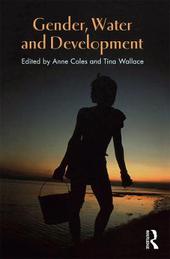
|
Gender, Water and Development
Paperback / softback
Main Details
| Title |
Gender, Water and Development
|
| Authors and Contributors |
Edited by Anne Coles
|
|
Edited by Tina Wallace
|
| Series | Cross-Cultural Perspectives on Women |
|---|
| Physical Properties |
| Format:Paperback / softback | | Pages:252 | | Dimensions(mm): Height 234,Width 156 |
|
| ISBN/Barcode |
9781845201258
|
| Classifications | Dewey:333.91 |
|---|
| Audience | | Tertiary Education (US: College) | |
|---|
|
Publishing Details |
| Publisher |
Bloomsbury Publishing PLC
|
| Imprint |
Berg Publishers
|
| Publication Date |
1 July 2005 |
| Publication Country |
United Kingdom
|
Description
There is a renewed global commitment to 'water for all'. Yet even though women are usually responsible for domestic water provision, their needs and voices continue to be marginalized in the development process. A close analysis of current policy and practice shows that organizations providing improved water supplies to poor communities typically neglect the gendered nature of access to and control over water resources. The resulting gender bias causes inefficiencies and injustices in water provision and reduces the effectiveness of well-meant efforts. This book shows how, in different environmental, historical and cultural contexts, gender has been an important element in water provision. It draws on a wide range of first-hand material, analyzed from different disciplinary perspectives. Case studies include analysis of the role of water in inhibiting the fight against HIV/AIDS in southern Africa, and the challenges of taking gender into account in large water projects in India and Nepal.
Author Biography
Anne Coles is Research Associate, International Gender Studies Centre, Queen Elizabeth House, University of Oxford. Tina Wallace is Research Associate, International Gender Studies Centre, Queen Elizabeth House, University of Oxford. Senior Research Fellow, School of Business, Oxford Brookes.
Reviews'Gender, Water and Development is recommended for graduate students, academic researchers, and development practitioners concerned with the gendered nature of water provision. With its interdisciplinary perspective and locally and historically situated analyses, this volume represents an important contribution to the literature on women and water.' Mei Elansary, Oxford University
|